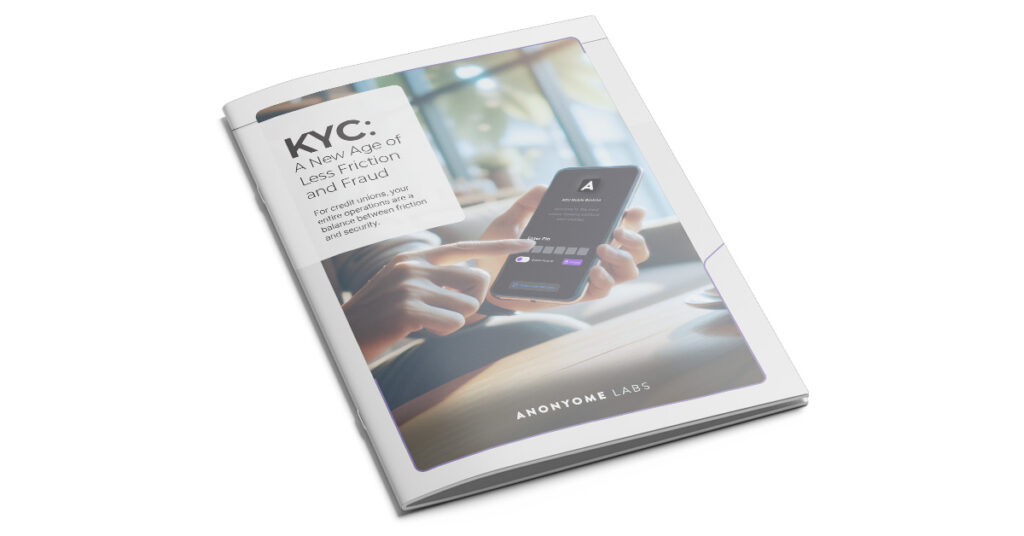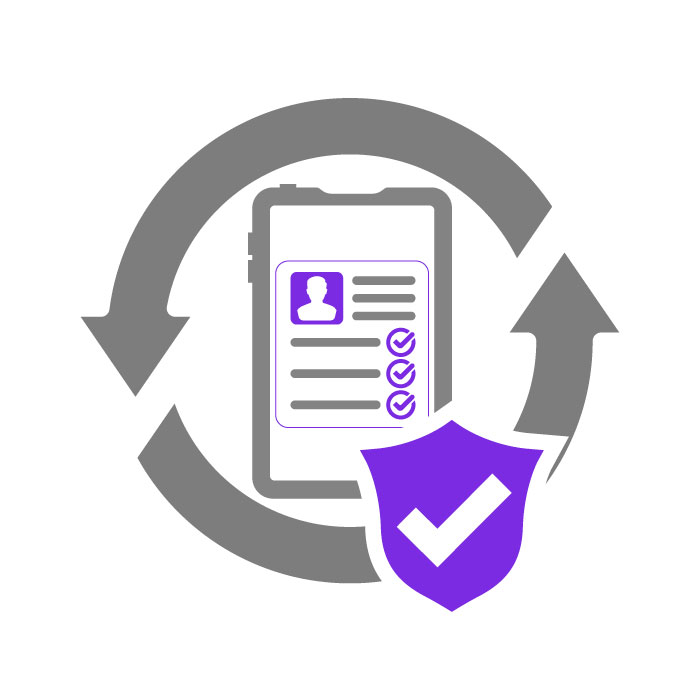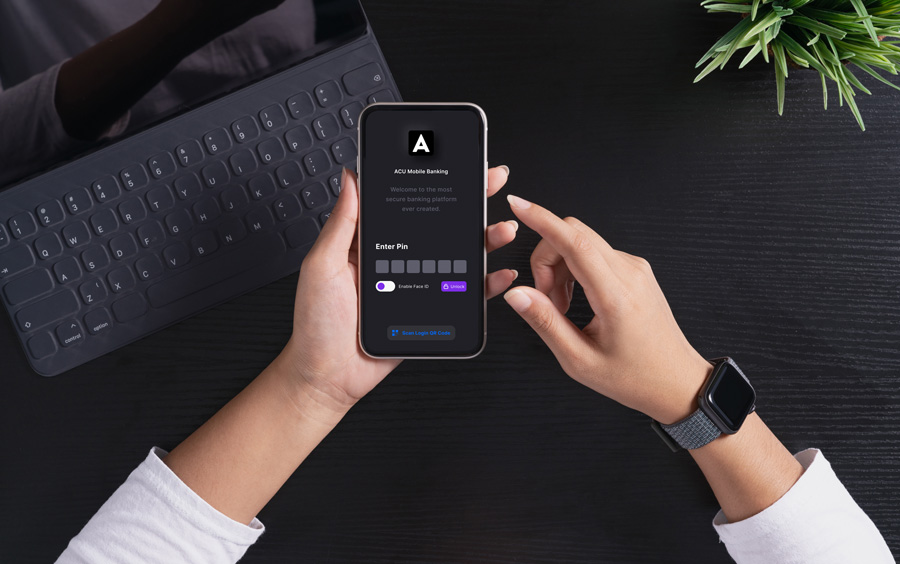According to the most recent PYMNTS Intelligence report, more than 40% of financial institutions (FIs) are seeing increasing volumes of fraud and financial crime. This puts credit unions between a rock and a hard place: friction vs security.
Quick catch-up: Traditional KYC methods often lead to tedious, friction-filled processes such as:
- Manual processing
- Relying on third parties
- Physical branch visits
- Delays in account access
- The list can go on and on.
But this process is now obsolete thanks to reusable credentials.
Why it matters: With reusable credentials, credit unions only need to verify a member once. By applying cutting-edge technology, reusable credentials not only take friction out of your operations, but makes every touch point more secure than ever before.
The big picture: Say goodbye to “What is your mother’s maiden name?” With reusable credentials, credit unions will revolutionize their operations and create an incredible member experience with seamless interactions in every channel.
Dive deeper

Beyond credit union KYC: the ongoing friction struggle
Friction is an ongoing challenge for credit unions at every touch point. There can be different login or verification experiences at every channel.
The core issue that causes most of the friction in your operations is the temporary nature of current credit union KYC and identity verification. While the initial KYC process validates a member’s identity for account opening, this verification is a one-time use and cannot be reused. For members to have day-to-day interactions with their credit union they’ll have to repeatedly verify their identity. Not to mention that the current methods can be reproduced by bad actors.
Security questions can be easily guessed through social engineering, tellers may struggle to differentiate between fake and real IDs, and SMS-based verifications are often indistinguishable from phishing.
The current credit union KYC process not only causes delays in member service and satisfaction but also burdens employees in the fight against fraud, potentially leading to financial losses.
Give your members the experience of “pre-check”
Drawing inspiration from the success of TSA Pre-check in travel, Anonyome Labs’ solution introduces credentials that are persistent, irrefutable, and customer-controlled. By applying this concept to credit unions, the result is an elevated member experience where KYC becomes a persistent validation process.
With reusable credentials, credit unions only need to verify a member once, ensuring seamless and secure interactions from account sign-up to every subsequent touchpoint. This innovative technology eliminates the need for repetitive verifications, reducing friction in member interactions, and enhancing overall security. (All without disrupting existing solutions, processes, or member experiences.)
Tellers can focus on member experience instead of fake IDs
Only 30% of financial institutions plan on taking feedback from their employees or their customers’ needs when selecting solutions partners.
Reusable credentials will transform your member and employee experience. Employees, especially those in critical roles such as call centers and tellers, will be empowered to be more effective for the overall security and satisfaction of credit union members.
Tellers and employees often bear the responsibility of verifying member identities, a task full of pressure and potential security risks. With reusable credentials, the burden is significantly lifted, as the need for repetitive verifications.
Call center employees can shift their focus from identity validation to enhancing the member experience, fostering quicker response times and more efficient interactions. Similarly, tellers are no longer in high-stress situations like having to distinguish between genuine and forged IDs.
Providing usable credentials cultivates a positive atmosphere for both employees and credit union members.

Credit union KYC innovation is easy
Credit unions are losing members due to a lack of innovation. A PYMNTS Intelligence research study found:
- 27% of credit union members say they would consider changing financial institutions (FIs) to access new products or more innovative solutions.
- This willingness to switch has increased to 27%, up from 17% since 2018.
- The share of CU members willing to switch to more innovative solutions is very close to the number of non-CU members willing to do the same, 29%.
Between member’s preferences and the continual increase in fraud, it is vital for credit unions to implement new technology.
Partnering with a technology provider, like Anonyome Labs, makes adding cutting-edge technology to your existing operations not only doable, but seamless. Our technology includes everything you need to build reusable credentials into your existing apps and systems. No need to rip and replace what’s been working for years.
FAQ: Reusable credentials and decentralized identity
How do reusable credentials work?

1. Initial identity verification: When a member joins a credit union or starts an account, a decentralized identity (DI) system verifies their identity using robust authentication methods.

2. Creation of reusable credentials: Once the member’s identity is verified, the DI system generates reusable credentials. These credentials are encrypted – making them tamper-proof and secure.

3. Ownership and control: Unlike traditional identity systems where organizations manage and store user data, decentralized identity gives ownership and control to the individual. For credit unions, this means the member owns their credentials and they are stored securely on their device, including the ability to store and present credentials from within your app and interfaces.

4. Verification at touchpoints: For every interaction with the credit union, whether it’s logging into an app, contacting the call center, or visiting a branch, the member can present their reusable credentials. These credentials serve as irrefutable proof of their identity without the need for repetitive verification processes.
How can reusable credentials help credit unions?

- Enhanced security: Reusable credentials enhance security by reducing the reliance on traditional methods prone to fraud. For example, traditional security measures, such as security questions that can be exploited through social engineering or SMS-based verifications that are susceptible to phishing, are replaced by reusable credentials.

- Frictionless member experience: Reusable credentials ensure a seamless and frictionless experience for credit union members. Once verified, members enjoy a continuous and secure interaction across various touchpoints without the need for repeated identity checks.

- Privacy protection: Since members control their reusable credentials, they have the flexibility to share only the necessary information at each interaction. This is a privacy-centered approach that gives individuals greater control over their personal data.
Reusable credentials redefine the way identity is managed, placing control in the hands of members and ensuring a secure, convenient, and privacy-focused experience across various credit union touchpoints.
See how reusable credentials can affect credit union operations here.
What is decentralized identity?

Decentralized identity (DI) is a shift in the way identity is managed. It is moving away from centralized systems controlled by organizations to a model where individuals have greater control over their own identity information.
A decentralized identity looks like this:
- Reusable credentials: Identity credentials, once verified, can become reusable and portable across various services and applications. Users can present their credentials without the need for repeated identity verification, streamlining interactions and reducing friction.
- Tamper-proof technology: Decentralized identity uses technology, such as blockchain, to record and verify identity information. This technology ensures that the data is secure, tamper-proof, and resistant to single points of failure.
- Secure communication: By its very nature, decentralized identity provides perpetual, irrefutable, and secure communication across all channels, with built-in, ultra-secure and immediate authentication and identity validation.
- Reduced identity fraud: By giving individuals control over their identity and leveraging advanced security technology, DI can drastically reduce the risk of identity fraud.
- Privacy by design: Privacy is a fundamental principle of DI. Users have control over what information they share. This approach contrasts with centralized systems where users often give over control of their data.
- User control: Individuals own and control their identity information. Unlike traditional systems where large organizations store and manage user data, decentralized identity empowers individuals to own and manage their digital identities. Protecting both individuals and organizations.
Decentralized identity has the power to reshape how individuals interact with digital services, ensuring greater privacy, security, and user control over their identity. As the technology continues to evolve, DI solutions are becoming increasingly relevant across various industries, including finance, healthcare, and beyond.
Dr. Paul Ashley, who’s spent over 25 years in the privacy and security space, says this about DI: “There’s been a decade of work before the projects the world is looking at now. I have rarely ever seen a technology that has been so thoughtfully designed as this from a security and privacy point of view.”
How can reusable credentials prevent fraud?
- Cryptographic security: Reusable credentials use advanced tech (cryptography) to secure information. This makes credentials tamper-proof which reduces the risk of fraudsters attempting to manipulate or replicate identity information.
- Irrefutable proof of identity: Once a user’s identity is verified and made into a reusable credential, it is irrefutable proof of their identity. Traditional methods, such as security questions or SMS verifications, are more susceptible to social engineering or phishing.
- Reduced weak security points: Traditional KYC methods often include the exchange of sensitive information, creating potential attack points for fraudsters. Reusable credentials limit the places where fraudulent activities can occur.
- Decentralized ownership: With decentralized identity, users own and control their reusable credentials. This decentralization minimizes the risk of large-scale data breaches, as there’s no single data center storing a vast amount of sensitive user information.
How can reusable credentials decrease friction?
- Seamless interactions: Reusable credentials streamline user interactions across various touchpoints, eliminating the need for repetitive identity verification. Once a user’s identity is verified and a reusable credential is established, subsequent interactions, whether online, in-app, or in-person, become seamless. This reduces friction and enhances the overall member experience.
- Single verification point: With reusable credentials, the need for repeated identity checks is gone. Users can verify their identity once, and the credentials can be used at different touchpoints without the necessity for additional verifications.
- Privacy and consent control: Users have control over what information is shared with service providers. They can selectively disclose only the necessary information for a particular interaction. This privacy-centric approach minimizes the amount of data exchanged, contributing to a smoother, more privacy-respecting user experience.
Are reusable credentials being used in other industries?
Reusable credentials are gaining traction and being explored in various industries beyond finance. Here are some examples:
- Healthcare: In the healthcare sector, reusable credentials can play a vital role in securely managing patient identities, medical records, and access permissions. Patients could have portable credentials for verifying their identity during medical visits, and healthcare providers can access relevant information securely.
- Government services: Governments are exploring DI and reusable credentials for services such as issuing digital IDs, driver’s licenses, and other official documents. This approach can enhance security, reduce identity fraud, and provide citizens with more control over their personal information.
- Education: In the education sector, reusable credentials can be used for academic certifications and transcripts. Students could have a secure and portable credential that verifies their education, which they can present to employers or other educational institutions.
- Farming and mining: Regulated industries, such as farming and mining, require members to comply with established regulations and to perform compliance reporting to government agencies. Reusable credentials can be used in these two industries when submitting reports to government agencies or receiving certifications – even across wildly disparate certifying bodies and reporting organizations.
- Supply chain and logistics: Reusable credentials can be applied in supply chain and logistics for secure tracking of products and verifying the authenticity of goods. This can help prevent counterfeiting and ensuring the integrity of the supply chain.
- Travel and hospitality: The travel industry is exploring the use of reusable credentials for seamless and secure identity verification at airports, hotels, car rentals, and other travel-related services. This could simplify the check-in process and enhance the overall travel experience.
- Retail and e-commerce: Reusable credentials can enhance the security of online transactions in retail and e-commerce by providing users with a secure and portable identity for authentication. This can help reduce fraud in online purchases.
- Human resources and employment: For employment-related processes, reusable credentials can be used for verifiable employment history, certifications, and qualifications and even background checks. This can streamline the hiring process and provide employers with confidence in the candidate’s credentials.
Reusable credential technology is promising; widespread adoption across industries is still evolving. Various pilot programs, initiatives, and collaborations are underway to explore the potential of decentralized identity and reusable credentials in solving identity-related challenges, improving security, and better user experiences across industries.
Credit unions, see how reusable credentials can affect credit union operations here.
If you are not the finance industry, don’t hesitate to reach out to Anonyome Labs to see what reusable credentials can do for your organization. Talk to us today!



